Kuli South Georgia Expedition
oct 29
#12: Journey's End: The Falklands
Publicado a las 17:25
The earthquake struck – and I was the only person who could feel it. The trembler hurled me from wall to wall in my home while my bemused family sat and watched. I slammed into the china cabinet, shattering some of my mother’s prized ceramics. As Mom shoved a tube of Superglue in my hand and demanded I repair the damage, my head hit the ceiling of my bunk on the Pelagic Australis. I woke up.
The dream was uncannily close to reality. It was the pre-dawn hours of Saturday, and a storm was smacking us around like a pro boxer sparring with a computer geek. Sleep was out of the question; our first priority was keeping ourselves from getting thrown to the floor. We were just over 100 nautical miles away from the Falklands, but the winds had slowed our progress to 1-2 miles an hour, dashing any hopes of arriving by Saturday night. It was a depressing development, especially for Dan, whom illness had confined to his bunk for most of the trip.
Imagine our relief that afternoon when the sea changed its mind, as if to say, “just kidding.” With speed restored to 5-6 miles an hour, our skipper Magnus set a course straight for Stanley, the Falklands capital. A feeling of great joy descended upon us as we motored into the harbor Sunday morning. Our first mate, Kali, who left South Georgia early due to intense back pain, was waiting on the dock with a case of Carlsberg. It was only 9 a.m. – but for those of us who partook, it truly hit the spot.
It was over. Goodbye sea, hello supermarket.
Most of our team will remember the six-day voyage from South Georgia as an ordeal. Yet Magnus said our crossing was actually one of the better ones.
Sometimes, storms ravage the boat for the entire journey, he said.
Until South Georgia becomes accessible by air, your land-lubbing correspondent will not be returning. Seasickness is the gift that keeps on giving: A day after leaving the Pelagic, the waves continue to roll through my head, making me dizzy even as I write these lines.
A Falklands hotel will be our home for the next six days as we await the once-weekly flight to Santiago.
The Falklands, population 3,000, is an odd oasis of Britishness in a South American landscape. The scenery is eerily bare – just scattered shrubs and grassy plains among low-lying volcanic mountains. Gale-force winds constantly sweep over the islands, no matter what the season. This may explain the apparent lack of beauty parlors in Stanley -- the wind would make it pointless for women to get their hair done.
There seems to be a preponderance of migrants from northern England, who might feel at home in this kind of climate. You hear North English accents everywhere – the Yorkshire lilt of the woman who runs the tourist shop, the Northumbrian inflections of the friendly policeman, to the drunken Scouse bellowing of the teenager outside the pub on disco night. “Oi! Vuh pahtee’s in heeyuh! In yeh kum!”
For a country that fought a war to keep these islands British 30 years ago, the UK seems to be investing scant amounts in the kind of technological infrastructure that could help the Falklands profit economically. According to locals, tourism makes up a significant portion of GDP – yet there is not a single ATM to give tourists easy access to their home-country bank accounts. Visitors who neglect to bring hard currency have to shell out for cash advances on their credit cards.
Internet exists, but is prohibitively expensive. Home customers pay 120 pounds a month for 3,000 megabytes of data; anyone who downloads a movie will use up his monthly allowance, our hotel manager said. The other option is, pay 1 pound for 10 minutes of wireless service in cafes. Free Wifi for customers is a foreign concept. To top it off, the service is slow.
None of this dampens Falklanders’ unabashed love for the UK. Pubs are festooned with Union Jacks. The very similar Falklands standard decorates the walls of homes across Stanley. Cars sport miniature British flags on their dashboards in the same place where Roman Catholics might keep a mini-statue of the Virgin Mary.
Yet beneath this nationalist zeal lurks a deep-set sense of insecurity, it seems. The source of the Falklanders’ malaise is Argentina, which continues to claim their homeland as its sovereign territory 30 years after being ousted by British forces. In recent years, Argentinians have once again begun rattling their sabers over the islands they call Las Malvinas, much to the consternation of virtually everyone who lives here.
The thought of a new Argentinian invasion is preposterous, but Falklanders are unwilling to laugh it off. Instead, they pile on an extra helping of patriotism. Homeowners attach signs displaying messages such as “The Falklands Are British!” to their fences, as if the ubiquitous Union Jacks were not proof enough. One Stanley pub, The Victory, has a toilet seat affixed to the wall of the gentlemen’s WC. Lift up the lid and you see a memorial to General Leopoldo Galtieri, president of Argentina during the Falklands War, who died in 2003. “Rot in hell, you asshole!” the brief obituary reads.
And so our journey ends.
The only outstanding item is our photos. Since uploading pictures from the Falklands is an expensive and time-consuming proposition, we will only be able to post them when we return to the United States on November 4-5. We will give you a shout once they are up. Please stop by Expenews and check them out!
The dream was uncannily close to reality. It was the pre-dawn hours of Saturday, and a storm was smacking us around like a pro boxer sparring with a computer geek. Sleep was out of the question; our first priority was keeping ourselves from getting thrown to the floor. We were just over 100 nautical miles away from the Falklands, but the winds had slowed our progress to 1-2 miles an hour, dashing any hopes of arriving by Saturday night. It was a depressing development, especially for Dan, whom illness had confined to his bunk for most of the trip.
Imagine our relief that afternoon when the sea changed its mind, as if to say, “just kidding.” With speed restored to 5-6 miles an hour, our skipper Magnus set a course straight for Stanley, the Falklands capital. A feeling of great joy descended upon us as we motored into the harbor Sunday morning. Our first mate, Kali, who left South Georgia early due to intense back pain, was waiting on the dock with a case of Carlsberg. It was only 9 a.m. – but for those of us who partook, it truly hit the spot.
It was over. Goodbye sea, hello supermarket.
Most of our team will remember the six-day voyage from South Georgia as an ordeal. Yet Magnus said our crossing was actually one of the better ones.
Sometimes, storms ravage the boat for the entire journey, he said.
Until South Georgia becomes accessible by air, your land-lubbing correspondent will not be returning. Seasickness is the gift that keeps on giving: A day after leaving the Pelagic, the waves continue to roll through my head, making me dizzy even as I write these lines.
A Falklands hotel will be our home for the next six days as we await the once-weekly flight to Santiago.
The Falklands, population 3,000, is an odd oasis of Britishness in a South American landscape. The scenery is eerily bare – just scattered shrubs and grassy plains among low-lying volcanic mountains. Gale-force winds constantly sweep over the islands, no matter what the season. This may explain the apparent lack of beauty parlors in Stanley -- the wind would make it pointless for women to get their hair done.
There seems to be a preponderance of migrants from northern England, who might feel at home in this kind of climate. You hear North English accents everywhere – the Yorkshire lilt of the woman who runs the tourist shop, the Northumbrian inflections of the friendly policeman, to the drunken Scouse bellowing of the teenager outside the pub on disco night. “Oi! Vuh pahtee’s in heeyuh! In yeh kum!”
For a country that fought a war to keep these islands British 30 years ago, the UK seems to be investing scant amounts in the kind of technological infrastructure that could help the Falklands profit economically. According to locals, tourism makes up a significant portion of GDP – yet there is not a single ATM to give tourists easy access to their home-country bank accounts. Visitors who neglect to bring hard currency have to shell out for cash advances on their credit cards.
Internet exists, but is prohibitively expensive. Home customers pay 120 pounds a month for 3,000 megabytes of data; anyone who downloads a movie will use up his monthly allowance, our hotel manager said. The other option is, pay 1 pound for 10 minutes of wireless service in cafes. Free Wifi for customers is a foreign concept. To top it off, the service is slow.
None of this dampens Falklanders’ unabashed love for the UK. Pubs are festooned with Union Jacks. The very similar Falklands standard decorates the walls of homes across Stanley. Cars sport miniature British flags on their dashboards in the same place where Roman Catholics might keep a mini-statue of the Virgin Mary.
Yet beneath this nationalist zeal lurks a deep-set sense of insecurity, it seems. The source of the Falklanders’ malaise is Argentina, which continues to claim their homeland as its sovereign territory 30 years after being ousted by British forces. In recent years, Argentinians have once again begun rattling their sabers over the islands they call Las Malvinas, much to the consternation of virtually everyone who lives here.
The thought of a new Argentinian invasion is preposterous, but Falklanders are unwilling to laugh it off. Instead, they pile on an extra helping of patriotism. Homeowners attach signs displaying messages such as “The Falklands Are British!” to their fences, as if the ubiquitous Union Jacks were not proof enough. One Stanley pub, The Victory, has a toilet seat affixed to the wall of the gentlemen’s WC. Lift up the lid and you see a memorial to General Leopoldo Galtieri, president of Argentina during the Falklands War, who died in 2003. “Rot in hell, you asshole!” the brief obituary reads.
And so our journey ends.
The only outstanding item is our photos. Since uploading pictures from the Falklands is an expensive and time-consuming proposition, we will only be able to post them when we return to the United States on November 4-5. We will give you a shout once they are up. Please stop by Expenews and check them out!
- Nombre: Stanley, Falkland Islands
- Elevación: 0 m
- Latitud: 51° 42’ 0” Sur
- Longitud: 57° 49’ 60” Oeste





















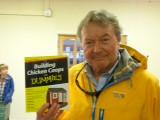


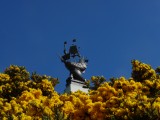
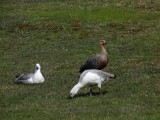
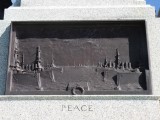
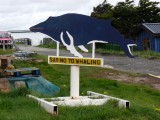

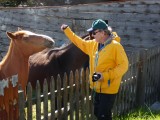

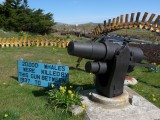
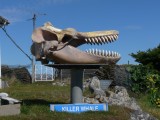
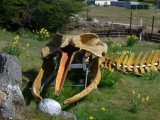
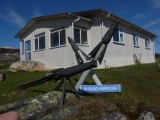
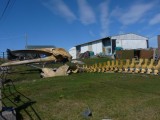


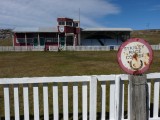
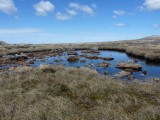


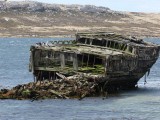


Comentarios